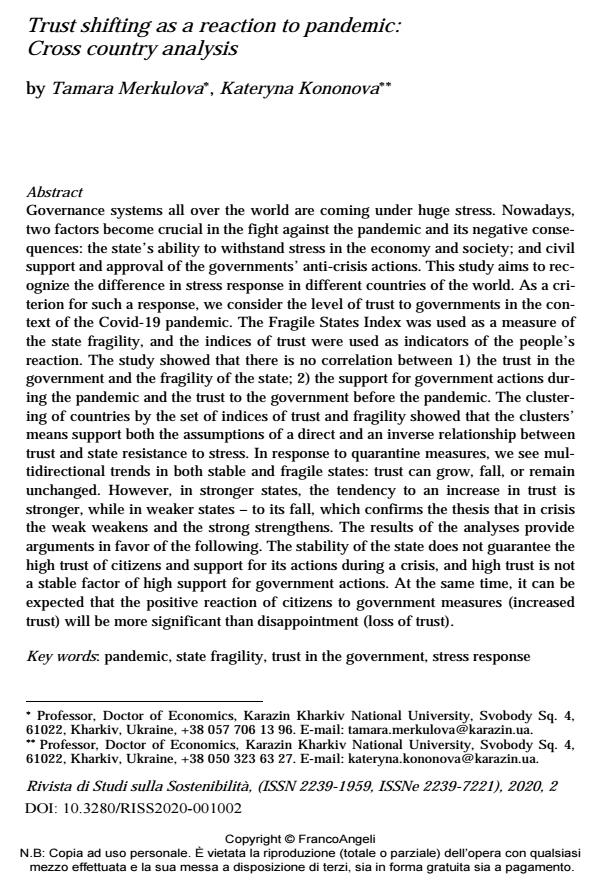Trust shifting as a reaction to pandemic: Cross country analysis
Titolo Rivista RIVISTA DI STUDI SULLA SOSTENIBILITA'
Autori/Curatori Tamara Merkulova, Kateryna Kononova
Anno di pubblicazione 2021 Fascicolo 2020/2
Lingua Inglese Numero pagine 23 P. 11-33 Dimensione file 251 KB
DOI 10.3280/RISS2020-002002
Il DOI è il codice a barre della proprietà intellettuale: per saperne di più
clicca qui
Qui sotto puoi vedere in anteprima la prima pagina di questo articolo.
Se questo articolo ti interessa, lo puoi acquistare (e scaricare in formato pdf) seguendo le facili indicazioni per acquistare il download credit. Acquista Download Credits per scaricare questo Articolo in formato PDF

FrancoAngeli è membro della Publishers International Linking Association, Inc (PILA), associazione indipendente e non profit per facilitare (attraverso i servizi tecnologici implementati da CrossRef.org) l’accesso degli studiosi ai contenuti digitali nelle pubblicazioni professionali e scientifiche.
Governance systems all over the world are coming under huge stress. Nowadays, two factors become crucial in the fight against the pandemic and its negative consequences: the state’s ability to withstand stress in the economy and society; and civil support and approval of the governments’ anti-crisis actions. This study aims to recognize the difference in stress response in different countries of the world. As a criterion for such a response, we consider the level of trust to governments in the context of the Covid-19 pandemic. The Fragile States Index was used as a measure of the state fragility, and the indices of trust were used as indicators of the people’s reaction. The study showed that there is no correlation between 1) the trust in the government and the fragility of the state; 2) the support for government actions during the pandemic and the trust to the government before the pandemic. The clustering of countries by the set of indices of trust and fragility showed that the clusters’ means support both the assumptions of a direct and an inverse relationship between trust and state resistance to stress. In response to quarantine measures, we see multidirectional trends in both stable and fragile states: trust can grow, fall, or remain unchanged. However, in stronger states, the tendency to an increase in trust is stronger, while in weaker states - to its fall, which confirms the thesis that in crisis the weak weakens and the strong strengthens. The results of the analyses provide arguments in favor of the following. The stability of the state does not guarantee the high trust of citizens and support for its actions during a crisis, and high trust is not a stable factor of high support for government actions. At the same time, it can be expected that the positive reaction of citizens to government measures (increased trust) will be more significant than disappointment (loss of trust).
Parole chiave:Pandemic, state fragility, trust in the government, stress response
- TRUST AND EFFICIENCY OF THE PUBLIC SECTOR: THEORETICAL ASPECTS OF INTERRELATION in Bulletin of V. N. Karazin Kharkiv National University Economic Series /2021
DOI: 10.26565/2311-2379-2021-100-03
Tamara Merkulova, Kateryna Kononova, Trust shifting as a reaction to pandemic: Cross country analysis in "RIVISTA DI STUDI SULLA SOSTENIBILITA'" 2/2020, pp 11-33, DOI: 10.3280/RISS2020-002002